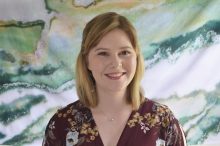
A conversation between Bodi Vasi and Kelci Mueller about life during the pandemic (lightly edited for clarity and space).
BV: How has the pandemic influenced your studies?
KM: I was part of the cohort of graduate students that came to the U of Iowa when the pandemic started. COVID not only impacted our transition into graduate school, but we also had to transition online. Everything was email and Zoom. It was difficult to stay engaged since we no longer had in-person connections. The transition also delayed my timeline but then it got better. We figured out how to work from home and navigate the online space as a learning tool. Before I would have thought that a meeting had to be in person, but arranging online meetings is easier.
BV: Has the pandemic changed your relationships with other students or with the professors?
KM: Yes and no. On the negative side, it made it harder for us to really get to know graduate students who were not in our small cohort. It also was difficult to network with professors outside of classes because we were not passing them in the hallway. Even in online meetings, there is not much room for one-on-one conversations, which are coming back now, thankfully.
BV: Was there anything positive about life during the pandemic?
KM: The flexibility of getting together online is good. I also do not get sick with minor illnesses as often because of the masks. The pandemic shed light on how important close relationships are, especially when things are feeling uncertain or scary (and potentially losing loved ones due to the pandemic). We luckily had social media, texting, phones, and Zoom to keep connected with those relationships. It showed how important those forms of communication are in modern society. I cannot imagine what life was like in the early 1900s!
BV: What sociological insight can you apply to make sense of the pandemic?
KM: Close friends and family as well as social networks are important to our mental health and wellbeing. It took time to adjust to the fact that we could not physically see some people in person. That made it even more important to stay connected to those that we love and care about. I am normally very shy and do not do well in large crowds or classrooms, but just being around other people helps. The human connection comes from that. During the pandemic, we did not have that normalcy, and online contact with our primary social groups helped with mental health.
BV: What lessons have you learned about human nature or “the meaning of life”?
KM: That we all need each other to survive and function. America especially has this idea of everyone for themselves and rugged individualism. The pandemic made clear how much we rely on other people to keep us healthy, both in terms of not spreading the virus but also for mental health. It also made me more empathetic towards others and emphasized that every life matters regardless of where they come from, who they are, and especially what they believe.